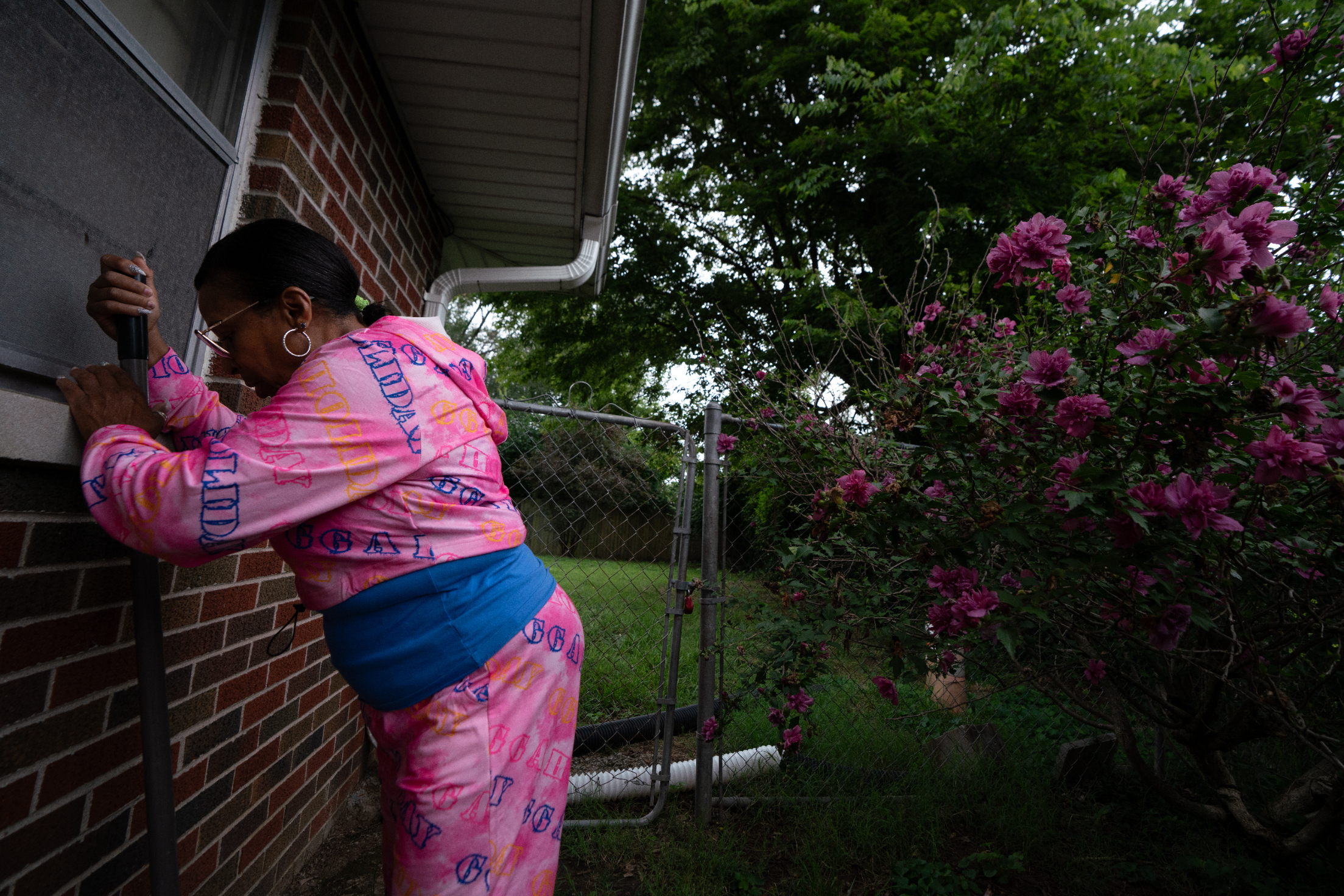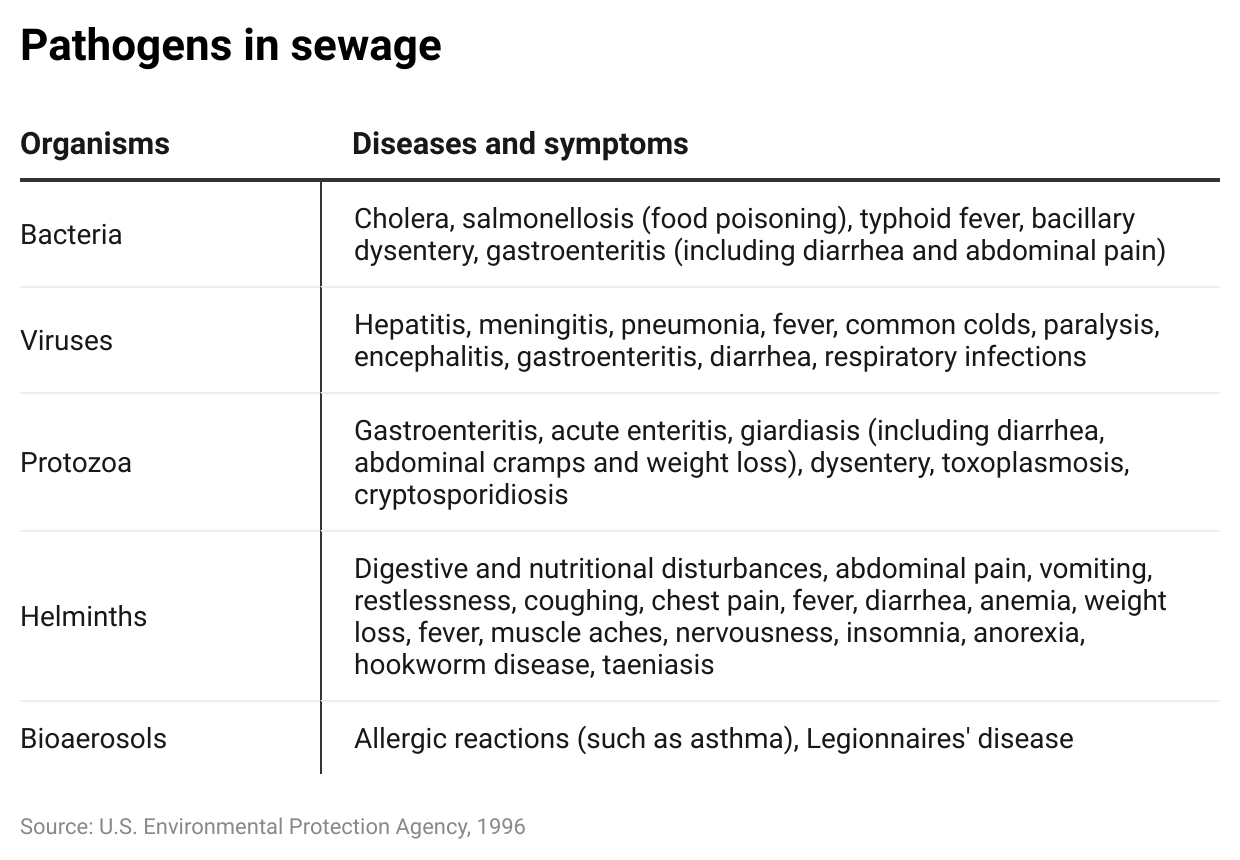
Originally published Dec. 11, 2023, by Belleville News-Democrat
State Rep. Kevin Schmidt has called on the Illinois Department of Public Health to investigate the health risks of sewage regularly spilling into homes in Cahokia Heights.
“I urge you to make the health of this community the priority it needs to be,” Schmidt wrote in a Nov. 14 letter to Illinois Department of Public Health Director Sameer Vohra.
Schmidt, who represents Cahokia Heights in the Illinois General Assembly, requested the investigation a day after publication of Hazardous Homes, a special report from the BND that revealed local and state health agencies failed to provide essential health services after residents’ homes flooded with sewage.
For decades in Cahokia Heights, sewage has backed up in toilets, sinks and bathtubs or spilled into homes with floodwater because heavy rain forces sewers to overflow onto the streets and residents’ properties. The infrastructure problems are especially pronounced in the northern area of the former city of Centreville, now part of Cahokia Heights.
To date, the East Side Health District and Illinois Department of Public Health haven’t investigated the possible health effects of chronic exposure to sewage and didn’t fully inform citizens of the risks they face, according to BND reporting.
In a statement Friday, the Illinois Department of Public Health said it was planning to arrange a meeting with Schmidt and the Illinois Environmental Protection Agency. The Illinois EPA is overseeing some funding allocated to Cahokia Heights and associated infrastructure improvement projects.
State and federal environmental agencies have been involved in enforcing rules about how public sewage systems should operate, but they don’t determine health effects when a system malfunctions.
“We acknowledge and appreciate the Representative raising this important concern for his district and will be responding to him directly,” the Illinois Department of Public Health stated. “We plan to meet with him in conjunction with our partners at the Illinois Environmental Protection Agency to discuss the issues affecting his residents and the state’s ongoing response to its underlying cause. The health and safety of Illinoisans is of the utmost importance to the Illinois Department of Public Health.”
Residents tired of waiting for a public health response have sought their own answers about how their health has been affected. They’re partnering with Washington University in St. Louis and the University of Colorado to conduct an ongoing health study in Cahokia Heights. The researchers found more than 40% of adults out of an initial sample of 42 last year had the same infection in their stomachs from the bacteria Helicobacter pylori, or H. pylori.
H. pylori can cause ulcers or increase the risk of gastric cancer.
Sewage can also make people sick through parasites, viruses and bioaerosols.

Residents said in BND interviews that stomach, respiratory and heart conditions are common among their neighbors.
Schmidt also sent a letter to Elizabeth Patton-Whiteside, public health administrator at the East Side Health District, asking why her agency hasn’t investigated or contacted state officials to request help.
Patton-Whiteside previously told the BND the health district hasn’t taken action because it hasn’t received any resident complaints of specific illnesses caused by the sewer problems. She repeated this explanation in a letter to Schmidt. The lawmaker’s office shared a copy of the response with the BND. Patton-Whiteside didn’t respond to a BND request for comment.
“If someone would complain to us, we would require medical documentation from their health provider that the issue was related to the sewer water directly and not another factor,” Patton-Whiteside wrote in the Nov. 16 letter to Schmidt. “Once this is verified with the medical provider, that information would be sent to IDPH for intervention because ESHD does not employ an epidemiologist to investigate such issues.”
In the BND’s special report, Cahokia Heights resident Yvette Lyles rejected Patton-Whiteside’s explanation. Public health officials have known for years that residents were exposed to sewage, Lyles said. When residents learned about the H. pylori infections from the universities’ health study, they shared the information with the health district. Lyles, 64, has been infected with the bacteria twice.
Patton-Whiteside wrote in her letter to Schmidt that she spoke with Vohra about the lawmaker’s concerns. “I applaud your efforts to help the residents of Cahokia Heights and we stand ready to assist as deemed necessary. IDPH has been made aware of this issue,” she wrote to Schmidt.
One of the concerns Schmidt’s letter cited was the bacterial infections the health study discovered. Patton-Whiteside hasn’t commented on the study. Mike Claffey, spokesperson for the Illinois Department of Public Health, previously downplayed the seriousness of H. pylori in a statement to the BND, saying it is one of the most common chronic bacterial infections worldwide.
It is found less often in developed countries like the United States, according to the Centers for Disease Control and Prevention.
“It doesn’t surprise me that people are getting sick given the fact that they have raw sewage coming in their homes, and it shouldn’t surprise any of these agencies either,” Schmidt said in an interview. A government investigation should have been done a long time ago, he added.
Schmidt, R-Millstadt, is a new representative for Cahokia Heights in House District 114. He defeated LaToya Greenwood, a Democrat from East St. Louis, in the 2022 election.
Schmidt noted that infrastructure fixes with local, state and federal money are starting on the city’s deteriorating sewer system, but he said residents’ health concerns need attention in the meantime.
“As for right now, there’s people that are sick. That can’t wait,” he said.
In addition to Schmidt’s call for a state investigation, U.S. Sens. Tammy Duckworth and Dick Durbin and Congresswoman Nikki Budzinski have asked the Centers for Disease Control and Prevention to help assess the health threats. The three federal lawmakers are Illinois Democrats.
Lyles and residents Patricia and Lonnie Greenwood said Monday they’re glad elected officials want to answer their health concerns, but they wonder why it took decades to happen.
In addition to H. pylori infections, Lyles has developed adult-onset asthma. Other members of her family have also had stomach and respiratory issues.
Patricia Greenwood, 73, has a long list of respiratory problems: asthma, sinusitis, and COPD with emphysema and bronchitis.
Lonnie Greenwood, 72, has had three strokes, two heart attacks and a gastric bleed in his small intestine. He said he recently got out of the hospital for another issue that affected his heart.
The Greenwoods’ 18-year-old adopted son Arthur also has trouble breathing.
“Maybe they can finally get down to what we already know: the cause of all this,” Patricia Greenwood said Monday in the family’s living room.
“That’s what we’re hoping for,” her husband Lonnie Greenwood added.
Lawyers Nicole Nelson and Kalila Jackson, who are representing a group of residents in two federal lawsuits over the deteriorating infrastructure, say they have been trying to help residents find experts to determine what the community is being exposed to since getting involved five years ago. The Illinois Department of Public Health was among the agencies where they requested help, according to Nelson.
They filed the lawsuits against local government agencies and officials, calling on them to fix the infrastructure and compensate people for property damage. Jury trials in those civil cases are scheduled to begin next year.
The residents group recently filed a civil rights complaint against St. Clair County with the U.S. Treasury Department, asking it to investigate how the county spent its COVID-related relief funds. The group argues the county discriminated against Black residents in Cahokia Heights by spending nearly all of the money in largely white communities while they faced an ongoing health crisis with sewage flooding their homes.
Over $30 million in local, state and federal money, which Duckworth and Durbin helped secure, has been allocated to Cahokia Heights’ infrastructure issues. Officials have acknowledged more funding is needed and estimated the work will take years to complete.
Beth Murphy, of the U.S. Environmental Protection Agency, has been given the job of coordinating the response and various funding from all levels of government after Budzinski, a freshman congresswoman, requested it.
In late October, Murphy started working to understand the current projects and the community’s needs, including residents’ health concerns, and to identify where gaps might exist, according to the EPA.